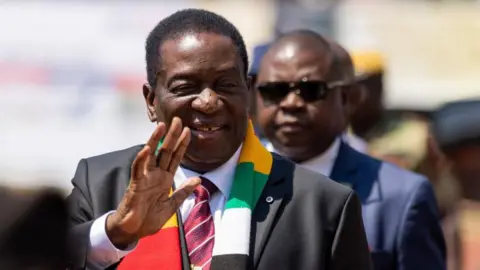Zimbabwe to scrap tariffs on US goods as it faces 18% Trump levy
 Getty Images
Getty ImagesZimbabwe's President Emmerson Mnangagwa has announced he will suspend tariffs on goods imported from the US in an attempt to build a "positive relationship" with President Donald Trump's administration.
The move comes days after Trump imposed 18% tariffs on Zimbabwean exports to the US.
"This measure is intended to facilitate the expansion of American imports within the Zimbabwean market, while simultaneously promoting the growth of Zimbabwean exports destined for the United States," Mnangagwa said on X.
Zimbabwe has had strained diplomatic relations with the US since it adopted a controversial land policy about 25 years ago, and because of its poor human rights record.
Trade between the two countries amounted to only $111.6m (£86.6m) in 2024, US government data shows.
The US exported goods worth $43.8m to Zimbabwe in 2024, up 10.6% from the previous year, while imports were down 41% to $67.8m.
Zimbabwean political analyst Tendai Mbanje told AFP news agency that the decision would not result in substantial economic benefits for Zimbabwe and would would only benefit the US.
Prominent Zimbabwean journalist and government critic Hopewell Chin'ono said the president appeared to be trying to "appease" the Trump administration.
Mnangawa possibly hoped that the administration would lift sanctions imposed on him, but it was a "long shot", he added on X.
The US first imposed sanctions on Zimbabwe's government during the rule of Robert Mugabe after he introduced a land reform programme in 2000 that led to the seizure of white-owned farms, and because of repressive measures taken against the opposition.
The Biden administration in the US scrapped the sanctions in 2024, replacing them with targeted sanctions on 11 individuals - including Mnangagwa - for "democratic backsliding, human rights abuses, and government corruption".
Mnangagwa has previously denied the allegations, describing the sanctions as "illegal and unjustified".
Announcing his decision to waive tariffs on US imports, he said Zimbabwe's focus was on "fostering amicable relations with all nations, and cultivating adversarial relationships with none".
"This action underscores our commitment to a framework of equitable trade and enhanced bilateral cooperation," he added.
Chin'ono said that Mnangagwa was currently the chairman of the regional bloc Sadc, and should be trying to forge a common response to the US rather than acting unilaterally.
"When countries face global economic shifts, co-ordinated responses offer better leverage and stability," he added.
Lesotho - another southern African state - was hit with 50% tariffs, the highest in the list released by Trump on Wednesday.
Its government said it would send a delegation to the US to negotiate a new deal, and it would look for new markets for its goods.
You may also be interested in:
 Getty Images/BBC
Getty Images/BBCGo to BBCAfrica.com for more news from the African continent.
Follow us on Twitter @BBCAfrica, on Facebook at BBC Africa or on Instagram at bbcafrica
